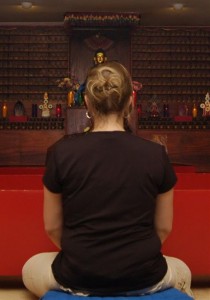
The following is an excerpt from a teaching called “Your Treasure is Heart”
In order to understand how mental discipline will help you feel more compassionate, you need to understand that compassion is not an emotion. Bodhichitta is not an emotion. It doesn’t exist on that dense a level. It’s not as dense as an emotion. Emotions are actually reactions. If you take perception, delusion, duality, confusion, hatred, greed and ignorance, all of those things that are characteristic of samsara, and you shake them up in a jar, the bubbles that you would get, like the bubbles from soap, are roughly the equivalent of emotions. Emotions are the result of conceptual proliferation, whipped up into a very exaggerated state. They are reactive. Bodhichitta really has nothing to do with that.
When we begin to give rise to the Bodhichitta, we do so, first of all, through mental discipline. As we begin to practice, we have some understanding of the suffering of sentient beings and why we should engage in loving concern for them. When we examine the thoughts that turn the mind, we really tune into the sufferings of samsara. We tune in, as well, to the fact that we have lived so many lifetimes that literally anyone that we can see, or see a picture of, or hear or think of has been our own kind parent in some previous life. Yet these beings are wandering in samsara just like a bee that’s caught in a jar, absolutely clueless as to how to create the causes by which their terrible suffering might end.
Once you learn that, you discipline your mind not to ignore it. We like to surf on the sensual pleasure of the moment. We like to enjoy, and try to get as high in our daily routine as possible, so we can just surf on the moment of experience. We don’t want to think about the condition of sentient beings. So this mental discipline is required in order to be a serious practitioner. You can’t cut corners here. If you don’t put in the time, your practice will never be up to snuff.
Many students come to me saying “Well, I just don’t feel this compassion.” My answer is, so what! Compassion is not an emotion. Nobody is going to benefit by how you feel. They’re going to benefit by what you do. So do the practice. Discipline yourself to contemplate the causes and conditions of both happiness and suffering; and particularly contemplate the suffering of sentient beings, These contemplations cannot be short-circuited. They must be delved into with everything you have. Once you do that you begin to feel a certain kind of determination and motivation, and it begins to make sense.
When I was 20, I had not met with the path of Dharma yet, but I was actually given these contemplations directly in my own meditation and in the dream state. So I began to practice them. What happened to me was I realized that compassion is the only thing that makes sense. Think about the logic of it. Here you are, one sentient being on our planet where in the human realm alone, there are roughly six billion of us. On our planet there are also uncountable animal forms. You can’t even count the number of ants in an ant hill. Each one of them is a sentient being with the Buddha nature within them, just as surely as you are, yet they appear in this form due to their own habitual tendency and the way that their consciousness is functioning. How many uncountable sentient beings can be seen with the eye on this planet alone!
If this absolute Buddha nature, this ground of being, is my nature, and you are that also, and yet we appear in these multitudinous forms, wandering and suffering in samsara, it made perfect sense to me to dedicate my life to the liberation and salvation of all sentient beings. Nothing else seemed logical or reasonable. And from that, gradually, this determination grew. For about ten months, I went through the mental discipline. I practiced for eight to ten hours a day only on those contemplations until I could see clearly for myself that this is the only game in town that made sense. With that knowledge, living any other kind of life seemed like whoring or prostitution to me, and it didn’t seem reasonable. So my discrimination was born.
In the Buddha’s teachings we are told that there are three thousand myriads of universes, three thousand myriads of universes. That’s just one number that gives us some understanding that we’re talking big! The Buddha also teaches us that there are formless realms, and there are uncountable sentient beings in these formless realms. So logically, if my nature is this Buddha nature, completely inseparable from the very Lord that I call Buddha, completely inseparable and indistinguishable from all these sentient beings, it is logical and reasonable that I would do everything that I can to bring benefit to others instead of spending my entire life in ego-gratification and self-cherishing. It is logical and reasonable also to me, that I will never be happy until every sentient being is free. That’s what seems reasonable to me.
Once you have that kind of understanding, you have to go through the process of reminding yourself, keeping it alive every step of the way. If any of you have been married, you know that taking the vow is not the end of the issue. If you want to remain in that situation, you really have to work at it. Giving rise to the Bodhichitta is like that . The effort doesn’t stop once you come to the great conclusion. You have to remind yourself every day. It’s part of the discipline of practice so that you remain mindful. On the path of Dharma these contemplations are crucial.
So this is how it starts. It starts in mental discipline which gives rise to determination. Where’s the emotion in all that? Emotions become inconsequential. Once you realize that there are six billion humans, that you know of, wandering in samsara, not understanding how to create the causes of happiness, whether you have gas at that moment or are in a good or a bad mood, those kinds of things become a moot point. You learn that it’s OK to be a Bodhisattva in a bad mood. But you don’t get to stop, you see, because you’ve learned something.
Copyright © Jetsunma Ahkon Lhamo. All rights reserved


